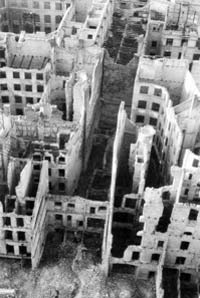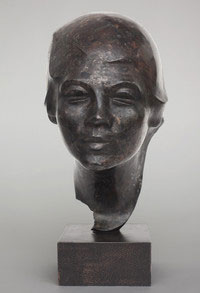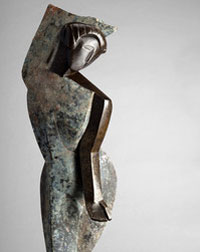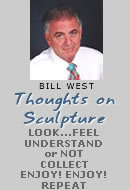
 Sculpture News at SculptSite.com
Sculpture News at SculptSite.com
Nazi-Designated 'Degenerate' Sculptures |
 A view of bomb-ruined Koenigstrasse in Berlin, Germany, on Sept. 27, 1946. On this site, 11 sculptures by artists condemned as ``degenerate'' by the Nazis were discovered during excavations before the construction of a new underground line. Source: Prussian Cultural Heritage Foundation via Bloomberg |
| Bloomberg by Catherine Hickley Nazi-Designated `Degenerate' Sculptures Unearthed From Berlin Bomb RubbleEleven sculptures by artists condemned as "degenerate" by the Nazis were unearthed from World War II rubble near Berlin's city hall, where building is about to start on a new underground train line. The sculptures, including bronzes by Edwin Scharff, Marg Moll and Karl Knappe, survived both the vilification of the Nazis and Allied fire-bombing in the war. The last objects in the trove were unearthed at the end of last month in excavations aimed at finding remnants of medieval history. The works will be exhibited at Berlin's Neues Museum from tomorrow. "We thought we were digging up a 13th-century medieval town hall, and instead we found 'degenerate' art," Hermann Parzinger, the president of the Prussian Cultural Heritage Foundation, said at a news conference today. "Archaeology is always good for a surprise." In 1937, the Nazis seized more than 20,000 modern works that they saw as contrary to Aryan ideals from German museums. That year, Propaganda Minister Joseph Goebbels staged the exhibition "Degenerate Art," which first opened in Munich, where it attracted more than 2 million people before moving on to other German and Austrian cities. The Nazis auctioned the seized artworks 1938, mainly abroad for hard currency. What couldn't be sold was stored in Berlin by a department of the Goebbels Propaganda Ministry. It is not yet known how the sculptures found their way to Koenigstrasse 50, the house that once stood on the site of the discovery. Protector of Jews Matthias Wemhoff, Berlin's chief archaeologist, said the 11 sculptures may have been preserved for posterity by a German tax adviser and business manager called Erhard Oewerdieck, who rented office rooms on the fourth floor of the house. Oewerdieck and his wife protected Jews from the Nazis, helping many to emigrate, and even hid a Jewish clerk in their own apartment. The bronze works are largely undamaged, though coated with a patina from the fire-bombing and from their lengthy sojourn underground. Wemhoff said that the individual wooden floors of the house all burned, with the contents sinking to the cellar. After the bombing, the houses on Koenigstrasse -- once a busy shopping street -- were empty shells. "The only things that survived are non-inflammable objects like bronze," Wemhoff told today's news conference. "It may well be that there were also wooden sculptures and graphics. We will try to find out more." Nazi Art Show Among the sculptures are Otto Baum's 1930 work "Standing Girl," Otto Freundlich's 1925 "Head," Knappe's "Hagar," Naum Slutzky's "Female Bust," Scharff's "Portrait of the Actress Anni Mewes," Gustav Heinrich Wolff's "Standing Figure," Emy Roeder's terracotta sculpture "Pregnant Woman," and Moll's "Dancer." Several featured in the Nazis' "Degenerate Art" exhibition. Three sculptures have yet to be identified. Two of the artists were Jewish: Slutzky managed to emigrate to London in 1933, while Freundlich was murdered at Majdanek concentration camp near Lublin. Mayor Klaus Wowereit said at today's news conference that the artworks are the property of Berlin, as is the case for any archaeological finds in the city. However, he said, the city is also talking to the original owners of the works. |
 Beauty is unearthed and comes to life after being buried by ugly sickness. The good and righteous always rise above the dark and hateful. What extremely beautiful sculpture works. |
 "Portrait of the Actress Anni Mewes" by Edwin Scharff. |
 "Dancer" by Marg Moll. The work is one of |
More Sculpture News ....
Submit your SCULPTURE NEWS.
It's easy, just send us an e-mail
(click on Submit News in the left menu) with your pertinent information along with images, we'll take care of the rest. Sculpture makes our world a much better place in so many ways!
SculptSite.com, along with Sculptors and their creative genius all helping to bring the beauty and message of Sculpture to a hurried world.

